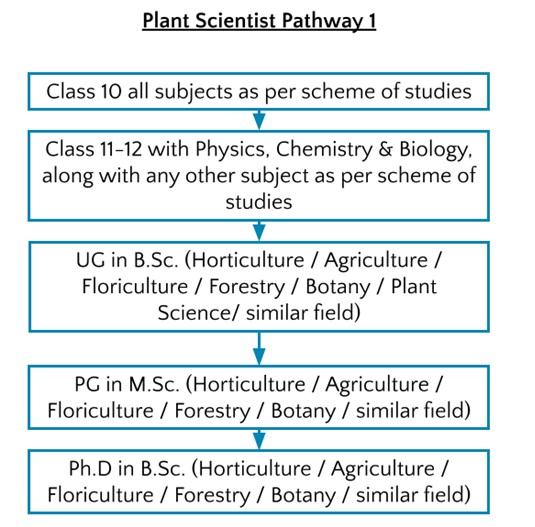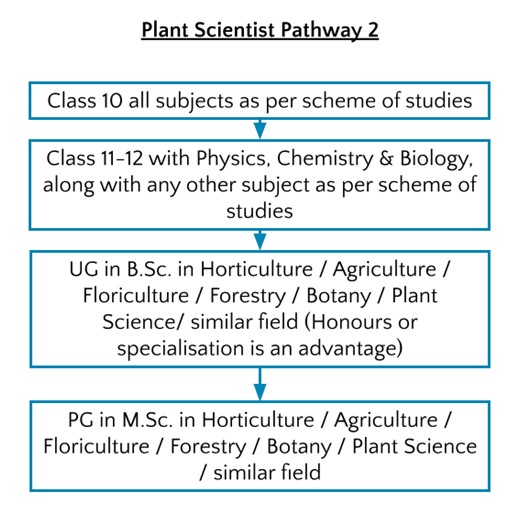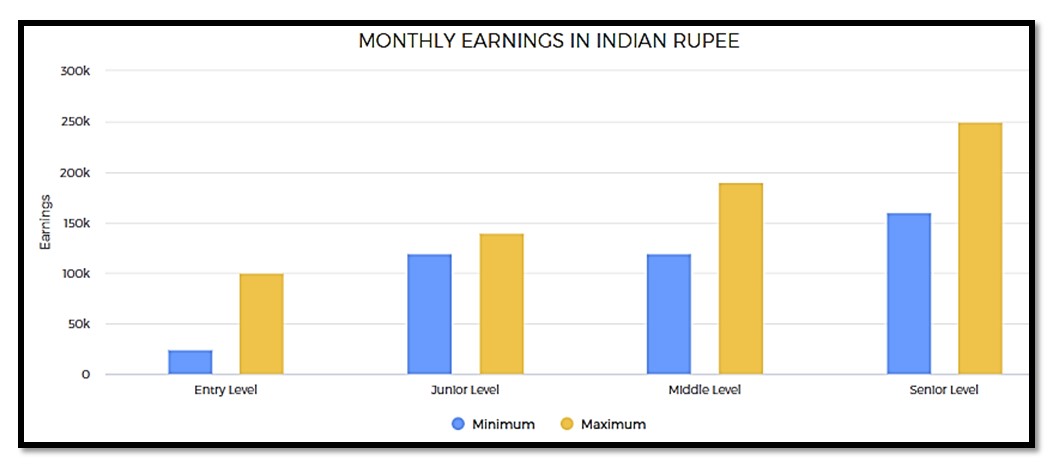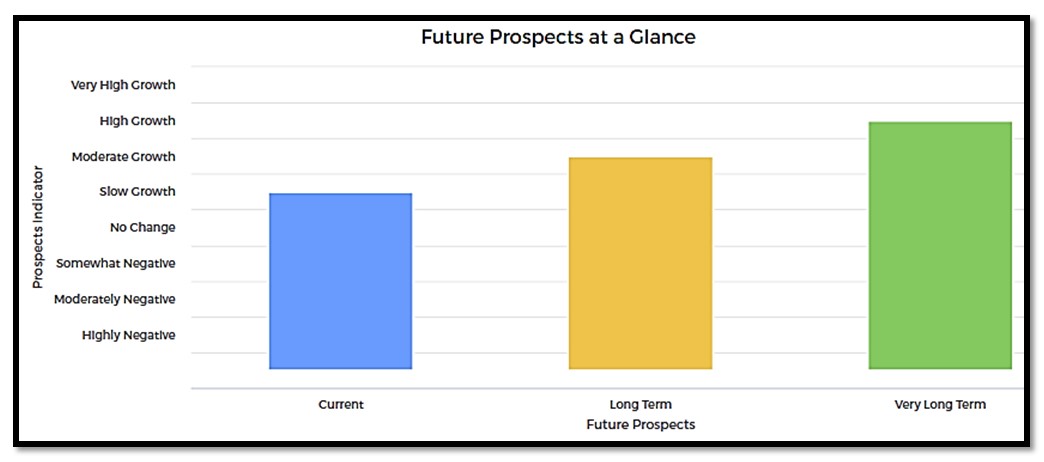Plant Scientist
Entry Level Qualification
Career Fields
Agriculture & Food Science
For Specially Abled







About Career
Plant Scientists are the scientists who will work in the field of crop and agriculture management. As a plant scientist, you will work on breeding better crops, improving the production yield of plants, studying the physiology of plants, etc. You will also study and work on research related to trees, shrubs, nursery plants, their growth in soil, pest management, etc. You will also study the chemical, physical, biological, and mineralogical composition of soils as they relate to plant or crop growth. You will work to maintain the national food supply. You will focus on improving the ways of agriculture, improving the techniques, and making agriculture more sustainable.
Key roles and responsibilities
As a Plant Scientist, depending on your field of specialization, you would have the following roles and responsibilities:
1. You will educate farmers and landowners about how they can best utilize the land, promote healthy growth of plants, and avoid the problem of erosion. They will give them recommendations for the same.
2. You will develop methods and products that are environmentally safe to eliminate weeds, crop diseases, or insect pests.
3. You will communicate research or project results to other professionals or the public or teach related courses, seminars, or workshops.
4. You will conduct experiments to develop new or improved varieties of field crops, focusing on characteristics such as yield, quality, disease resistance, nutritional value, or adaptation to specific soils or climates.
PARTICULARS | DESCRIPTION |
Name | Plant Scientist |
Purpose | Work On Breeding Better Crops |
Career Field | Agriculture & Food Science |
Required Entrance Exam | BHU PET, BHU RET, CUET PG, ICAR PG, ICAR PHD |
Average Salary | 300000 - 900000 Rs. Per Year |
Companies For You | Toothpaste Manufacturers, Patanjali, Dabur & Many More |
Who is Eligible | Post Graduate |
Career Entry Pathway
Class 10 all subjects as per scheme of studies– Class 11-12 in Science stream with Physics, Chemistry & Biology along with any other subject as per scheme of studies– UG in B.Sc. (Horticulture / Agriculture / Floriculture / Forestry / Botany / Plant Science/ similar field) – PG in M.Sc. in (Horticulture / Agriculture / Floriculture / Forestry / Botany/ similar field) – Ph.D. in (Horticulture / Agriculture / Floriculture / Forestry / Botany /similar field).

After Class 11-12 in Science stream with Physics, Chemistry & Biology along with any other subject as per the scheme of studies–, you can study science stream with Physics, Chemistry & Biology in your higher secondary school and then study for an undergraduate science degree in Horticulture / Agriculture / Floriculture / Forestry / Botany / Plant Science/ similar field (Honours or specialization is an advantage) followed by a master’s degree in Science stream in Horticulture / Agriculture / Floriculture / Forestry / Botany / Plant Science/ similar field. After a Master’s Degree, you can take a Ph.D. in Horticulture / Agriculture / Floriculture / Forestry / Botany / Plant Science/ similar field.

After Class 11-12 in Science stream with Physics, Chemistry, and biology along with any other subject as per the scheme of studies, you can study science stream with Physics, Chemistry and biology in your higher secondary school and then study for an undergraduate science degree in Horticulture / Agriculture / Floriculture / Forestry / Botany / Plant Science/ similar field (Honors or specialization is an advantage) followed by a master’s degree in Science stream in Horticulture / Agriculture / Floriculture / Forestry / Botany / Plant Science/ similar field.
Required Qualification & Competencies
Undergraduate studies after school
1. To become a plant scientist, you should complete your schooling in Biology, Chemistry, and Physics and join an undergraduate course for a Bachelor of Science in Biotechnology / Zoology/ Botany / Fisheries/ Dairying / Plant Science / Plant Biotechnology / similar field, etc.
2. Alternatively, you can study Horticulture / Agriculture / Floriculture / Forestry / similar field in 4 year B.Sc. course.
Post Graduate studies
After finishing graduation, you can take the M.Sc. course in the various fields of Plant Science. At this level, you will study any of the following specializations Agriculture, Horticulture, Floriculture, Bioinformatics, Plant Ecology, Nematology, Photochemistry, Plant Biochemistry, Plant Biology, Plant Biotechnology, Plant Breeding and genetics, Plant Genetic Resources, Plant Microbiology, Plant Molecular Biology & Biotechnology, Plant Pathology, Plant Physiology, etc.
Doctoral Studies
The Plant Scientist is specialized, and thus research becomes an important part of the pathway. Thus, after completing Post Graduate Studies, you can choose to take a Ph.D. in Vegetable Science, Fruit Science, Sericulture, Bioinformatics, Plant Ecology, Nematology, Photochemistry, Plant Biochemistry, Plant Biology, Plant Biotechnology, Plant Breeding and genetics, Plant Genetic Resources, Plant Microbiology, Plant Molecular Biology & Biotechnology, Plant Pathology, Plant Physiology, etc.
MINIMUM EDUCATION REQUIRED | MAXIMUM EDUCATION REQUIRED |
Post Graduate Postgraduate Degree / Diploma / Certificate Programs for which the minimum eligibility is a pass in Graduation / equivalent Diploma program like Honours Diploma or Graduate Diploma. | Doctoral All Ph.D. or equivalent degree programs for which the minimum eligibility is a Postgraduate or a Pre-Doctoral degree. |

Competencies Required
You should have the following occupational interests:
1. Investigative - You should have an interest in Investigative Occupations. Investigative occupations involve working with ideas and quite a lot of thinking, often abstract or conceptual thinking. These involve learning about facts and figures; involve the use of data analysis, assessment of situations, decision-making, and problem-solving.
2. Realistic - You should have an interest in Realistic Occupations. Realistic occupations involve more practical and hands-on activities than paperwork or office work. Realistic occupations often involve physical activities for getting things done using various tools and equipment.
The following personality attributes are required:
1. You are always or mostly organized in your day-to-day life and activities.
2. You are always or mostly disciplined in your actions and behavior.
3. You are always practical in most situations.
4. You always or mostly care about your actions and behavior.
You should have the following skills and knowledge:
1. Reading Comprehension - Skills in understanding written sentences and paragraphs in work-related documents.
2. Critical Thinking - Skills in the analysis of complex situations, using logic and reasoning to understand the situations and take appropriate actions or make interpretations and inferences.
3. Scientific - Skills in using various scientific rules and methods to get things done or solve problems.
4. Active Learning - Focused and continuous learning from various sources of information, observation, and otherwise for application in getting work done.
5. Problem Solving - Skills in analysis and understanding of problems, evaluating various options to solve the problems, and using the best option to solve the problems.
6. Biological Science - Knowledge of plants and animals, their anatomical structure, cell structure, tissues, physiological functions, evolution, and all other related aspects.
7. Chemical Science - Knowledge of the chemical composition, structure, and properties of substances and of the chemical processes and transformations that they undergo. This includes the uses of chemicals and their interactions, toxicity, production techniques, and disposal methods.
8. Education & Training - Knowledge of various principles and methods of developing training or teaching curriculum, the design of instructional methods, developing course materials, teaching, and instructing individuals and groups.
You should have the following aptitudes and abilities:
1. Oral Comprehension - The ability to listen to and understand information and ideas presented through spoken words and sentences.
2. Inductive Reasoning - The ability to combine pieces of information from various sources, concepts, and theories to form general rules or conclusions. For example, analyzing various events or situations to come out with a set of rules or conclusions.
3. Written Comprehension - The ability to read and understand information and ideas presented in writing.
4. Deductive Reasoning - The ability to apply general rules and common logic to specific problems to produce answers that are logical and make sense. For example, understanding the reasons behind an event or a situation using general rules and common logic.
5. Category Flexibility - The ability to generate or use different sets of rules for combining or grouping things in different ways.
Career - Job Opportunities & Profiles
1. Most of the universities and colleges will hire you as a professor at the position of Junior Professor or Assistant Professor. If you are into research, then you will be hired for the position of research associate. Ph.D. research fellows will be hired as a Junior Research Fellow.
2. Research laboratories and Research Institutes will hire you as a scientist/scientist officer with the lowest grade (Grade C).
You can find job opportunities at the following facilities:
1. Agricultural Research Organizations and Institutes.
2. National Parks and Wildlife Sanctuaries
3. Agriculture, Plant Science, and related colleges and universities.
4. Research centres and laboratories like the National Institute of Plant Research Genome.
5. Fertiliser Plants
6. Private agrarian solutions companies like Cropdata Technology Private Limited.
7. Herbal Products companies like toothpaste manufacturers, Patanjali, Dabur, etc.
Work Environment
As a Plant Scientist, you will be mostly involved in research work. Most of your research will be in the field, especially research farms. You will have a regular 8-9 hours job that will require a peer to peer work. While working in the field is safe, you will need to wear proper accessories to prevent any damage while contacting pesticides.
Specialisation Tracks In This Career
1. Plant Biochemist
Plant Biotechnologists specialise in using scientific tools and techniques like genetic engineering, molecular markers, molecular diagnostics, vaccines, and tissue culture, in modifying living organisms: plants, animals, and microorganisms. A crop biotechnologist is an expert who exports particular traits of one crop to other species of crop.
2. Plant Ecologist
Plant Ecologists specialise in understanding the distribution of plants. They study the soil, environment, and works of the increasing plantation of agricultural plants in the right environment. They use research to find a new environment where a plant can be grown. They also survey ecosystems and assess the diversity, profusion, and behaviour of the different organisms within them.
3. Plant Physiologist
A Plant Physiologist is a scientist who specialises in studying the functions of plants. They study Fundamental processes such as photosynthesis, respiration, plant nutrition, plant hormone functions, seed germination, etc.
4. Agronomist
Agronomists are agriculture scientist who specialises in using plants for human production of food, fuel, fibre, etc. They research seeds, fertilizers, soil, plant breeding, and technologies to ensure plants can be used optimally. Agronomists are involved in various agricultural issues like producing food, creating healthier food, managing the environmental impact of agriculture, extracting energy from plants, crop rotation, irrigation and drainage, plant breeding, plant physiology, soil classification, soil fertility, weed control, and insect and pest control.
5. Horticulturist
Horticulturists specialise in cultivating plants for fruits, vegetables, flowers, etc. They work in the fields of plant conservation, landscape restoration, soil management, landscape and garden design, construction, and maintenance.
Career Growth
1. Research laboratories will hire you as a scientist/scientist officer with the lowest grade and the grade changes from low to high. In India, grades are “Scientist “C” as the joining level and then D, E, F, G, H and finally DS. A senior-level scientist can also get into administrative positions like Principal Scientist, Assistant Director, Deputy Director, Director, etc.
2. My career growth in university and college started as an Assistant Professor and then as Associate Professor, Professor and Professor Emeritus. Professors can also get administrative positions such as Director/Dean/Vice Chancellor, etc.
3. If you are recruited as a research associate (JRF and SRF), then you will go on to become a Doctoral Research Fellow, then a Post-Doctoral Research Fellow and then a Scientist in Progressive Grades.
4. If you join a private organisation in the field of agriculture, fertilizers, etc. as a research scientist, then you will move to senior research scientist and principal scientist with work experience.
Salary Offered
1. At the entry-level, you can join as a research associate with a basic salary of Rs. 25,000 INR to 30,000. As a doctoral research fellow (junior research fellow) you would be earning around Rs. 35,000 to 38,000 per month. At the entry level, as a Scientist (grade C) you would be earning around Rs. 80,000 to 100,000 per month. As an assistant professor, you would be earning anything between Rs. 65,000 INR to 70,000 per month. As a scientist in a private companies, you will earn anything between Rs. 25,000 to 1,00,000 per month.
2. At the junior level with a work experience of 2-6 years, you would be earning anything between Rs. 1,20,000 INR to 1,40,000 per month.
3. At the middle level with an experience of 10-12 years, you would be earning anything between Rs. 1,40,000 to 1,90,000 per month as a scientist and Rs. 1,20,000 INR to 1,60,000 as a professor.

Monthly Earnings In Indian Rupee
Entry Level | Junior Level | Mid Level | Senior Level | ||||
Min Earning | Max Earning | Min Earning | Max Earning | Min Earning | Max Earning | Min Earning | Max Earning |
20000 | 70000 | 25000 | 100000 | 40000 | 150000 | 50000 | 200000 |
1. Entry level: 0 - 2 years of work experience
2. Junior Level: From 1 to 12 years of work experience
3. Mid-Level: From 5 to 20+ years of work experience
4. Senior Level: From 10 to 25+ years of work experience (there could be exceptions in some high-end technical, financial, engineering, creative, management, sports, and other careers; also shortly, people will reach these levels much faster in many careers and some careers, these levels will have no meaning as those careers will be completely tech skill driven such as even now, there is almost no level in a Cyber Security Expert’s job)
Work Activities
As a Plant Scientist, you might be involved in various applied and theoretical areas of Biology. In these areas, you might be involved in different activities such as:
1. Working with computers, programming, and performing technical tasks - Using computers for day-to-day office work; using computer software for various applications in day-to-day professional work; entering data and processing information; for writing.
2. Analysis and interpretation of data and information - Analysis of data and information to find facts, trends, reasons behind situations, etc.; interpretation of data to aid in decision-making.
3. Information processing - Searching, compiling, tabulating, calculating, auditing, verifying, or otherwise dealing with information processing including data entry, transcription, recording, storing, and maintaining databases.
4. Updating & using relevant information - Keeping updated with the latest knowledge relevant to your fields of work and use of the relevant knowledge in getting things done.
5. Getting information & learning - Observing, hearing, reading, using computers, or otherwise obtaining information and learning from it.
Future Prospects
Agriculture is still the primary source of livelihood for 58% of the Indian population. The share of Agriculture in GDP is around Rs. 17.67 trillion. With over 130 crore people depending on food, agriculture is by far one of the most important industries in India. With limited scope in an increase in agricultural land, the reforms to improve the sector come through scientific reforms. Thus, the role of plant scientists and agriculture scientists have been acknowledged. Even the Government has initiated Agri-Udaan as a way to promote agriculture start-ups. While the Government has seen the vision of doubling farmers' income, this can only be achieved by implementing more reforms in agricultural infrastructures such as irrigation facilities, warehousing, and cold storage. Many of these reforms require a large number of agriculture scientists.

Future Prospects At A Glance
Current (0-1 year) | Long Term (2-5 years) | Very Long Term (6-10 years) |
Slow Growth | Moderate Growth | High Growth |


